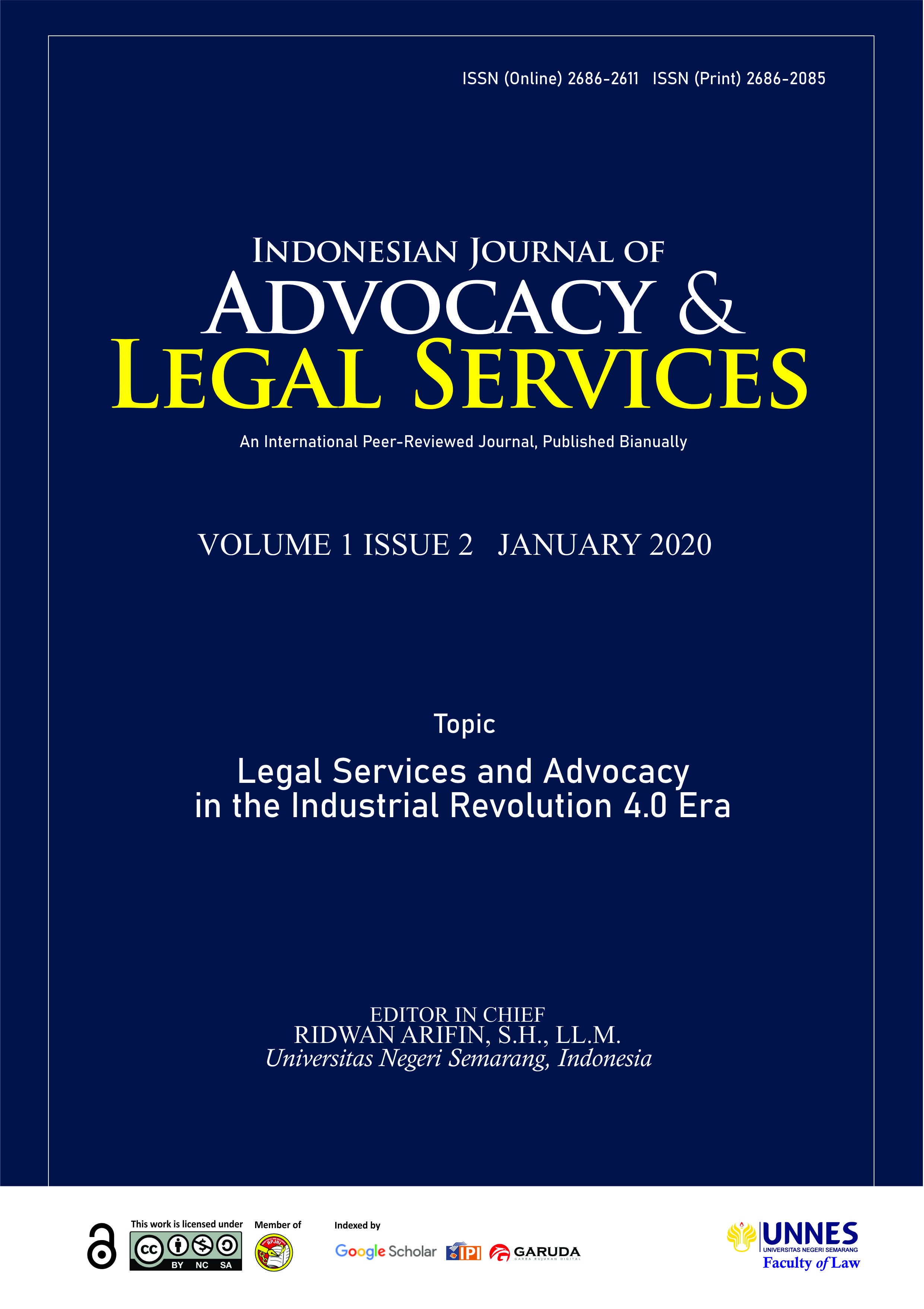Code of Ethics and the Role of Advocates in Providing Legal Aid to the Poor
Main Article Content
Abstract
Law No. 18 of 2003 concerning Advocates emphasizes the status of Advocates as one of the law enforcers who have roles and functions that are equal to the Police, Prosecutor's Office and Judicial Power as law enforcement officers, but there is specialness given by the law to lawyers, namely the independence of advocates in carrying out their duties and profession. The independence of advocates aims to support the implementation of a justice system that is free from power and political intervention in law enforcement, and with that independence the Advocate Profession is said to be a very noble profession (offiicium nobile). As a noble profession, of course, advocates are bound by ethical values ​​that become the guidelines in the implementation of their duties and authorities, where those values ​​are posited as a Professional Code of Ethics. Talking about advocates, of course it cannot be separated from law enforcement, talking about law certainly cannot be separated from the state system or the political colors of certain countries and so on. This article wants to explain how the code of ethics of the advocate profession in upholding the law is how the role of advocates in providing justice to society based on applicable law. In conclusion, this article wants to explain that the code of ethics can compensate for the negative aspects of the profession and with the existence of a code of ethics, community trust in a profession can be strengthened, because every client has the assurance that his interests will be guaranteed, and the implementation of legal aid must be in line with the breath that becomes the goal is protection human rights and ideals of justice.
Article Details
The Authors(s) retain copyrights of the Article published on Indonesian J. Advoc. Legal Serv. However, before publishing, it is required to obtain written confirmation from Author(s) in order to ensure the originality (Author Statement of Originality). The statement is to be signed by at least one of the authors who have obtained the assent of the co-author(s) where applicable. This work licensed under a Creative Commons Attribution-NonCommercial-ShareAlike 4.0 International (CC BY-NC-SA 4.0).
References
Alkotsar, A. (2010). Peran dan Tantangan Advokat dalam Era Globalisasi. Yogyakarta: FH UII Press.
Angga, A. & Arifin, R. (2019). Penerapan Bantuan Hukum Bagi Masyarakat Kurang Mampu di Indonesia. DIVERSI: Jurnal Hukum, 4(2), pp. 218-236. DOI: https://doi.org/10.32503/diversi.v4i2.374.
Arifin, R., Rasdi, R., & Alkadri, R. (2018). Tinjauan Atas Permasalahan Penegakan Hukum dan Pemenuhan Hak dalam Konteks Universalime dan Relativisme Hak Asasi Manusia di Indonesia. Jurnal Ilmiah Hukum LEGALITY, 26(1), 17-39 DOI: https://doi.org/10.22219/jihl.v26i1.6612.
Chairani, M.A. (2018). Hak Imunitas Advokat Terkait Melecehkan Ahli. Justitia Jurnal Hukum, 2(1), 144-163. DOI: http://dx.doi.org/10.30651/justitia.v2i1.1236
Bertens, K. (2005). Etika. Jakarta: Gramedia Pustaka Utama.
Kasim, N.M., & Kamba, S.N.M. (2019). Implementation of Assistance for Victims of Domestic Violence. Indonesian Journal of Advocacy and Legal Services, 1(1), 147-156. https://doi.org/10.15294/ijals.v1i1.33801.
Law Number 18 of 2003 concerning Advocates (State Gazette of the Republic of Indonesia of 2003 Number 49, Additional State Gazette Number 4288).
Law Number 16 of 2011 concerning Legal Aid (Republic of Indonesia State Gazette Year 2011 Number 104, Additional Republic of Indonesia State Gazette Number 5248).
Lubis, A. (2016). Peran Advokad dalam Penegakkan Hukum di Organisasi Asosiasi Advokad Indonesia Cabang Medan. Jurnal Ilmu Pemerintahan dan Sosial Politik, 4(1), 176-192. DOI: http://dx.doi.org/10.31289/jppuma.v2i2.922
Lubis, T. M. (1983). Bantuan Hukum dan Kemiskinan Struktural. Jakarta: Cendana Press.
Moonti, R.M. (2019). Regional Autonomy in Realizing Good Governance. Substantive Justice International Journal of Law, 2(1), 43-53. DOI: 10.33096/substantivejustice.v2i1.31
Nurmala, L.D. (2018). Perlindungan Hukum Terhadap Tenaga Pendidik. Gorontalo Law Review, 1(1), 67-76. DOI: https://doi.org/10.32662/golrev.v1i1.98.
Poerdarminta, P. (2001). Kamus Lengkap Bahasa Indonesia. Jakarta: Rineka Cipta.
Putri, K.D.A., & Arifin, R. (2019). Tinjauan Teoritis Keadilan dan Kepastian dalam Hukum di Indonesia (The Theoretical Review of Justice and Legal Certainty in Indonesia). MIMBAR YUSTITIA, 2(2), 142-158. Retrieved from http://e-jurnal.unisda.ac.id/index.php/mimbar/article/view/1344
Rahmat, D. (2017). Implementasi Kebijakan Program Bantuan Hukum Bagi Masyarakat Tidak Mampu di Kabupaten Kuningan. Jurnal Unifikasi, 4(1), 35-42. DOI: https://doi.org/10.25134/unifikasi.v4i1.478
Soekamto, S. (1983). Bantuan Hukum, Suatu Tinjauan Sosio-Yuridis. Jakarta: Ghalia Indah.
Soekanto, S. (1999). Rangkuman Intisari Ilmu Hukum. Bandung: Citra Aditya.
Ujan, A.A. (2007). Profesi: Sebuah Tinjauan Etis. Studia Philosophica et Theologica, 7(2), 138-155. http://ejournal.stftws.ac.id/studia/index.php/studia/VOL07/NO2/2
Utari, I.S., & Arifin, R. (2019). Law Enforcement and Legal Reform in Indonesia and Global Context: How the Law Responds to Community Development? Journal of Law and Legal Reform, 1(1), 1-4. https://doi.org/10.15294/jllr.v1i1.35772.
Wignyosoebroto, S. (2003). Hukum: Paradigma, Metode dan Dinamika Masalahnya. Jakarta: ELSAM and HuMA.
